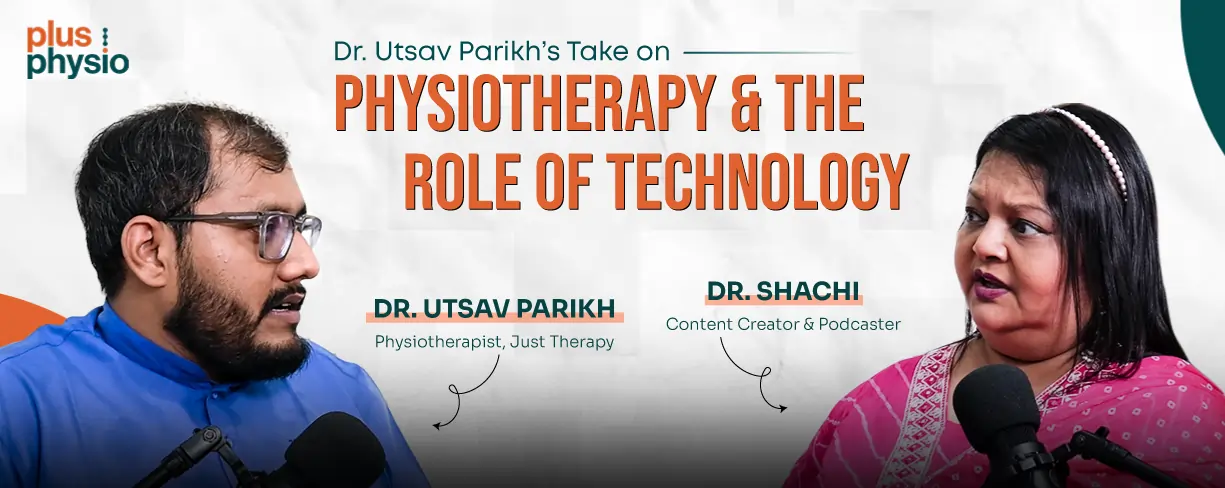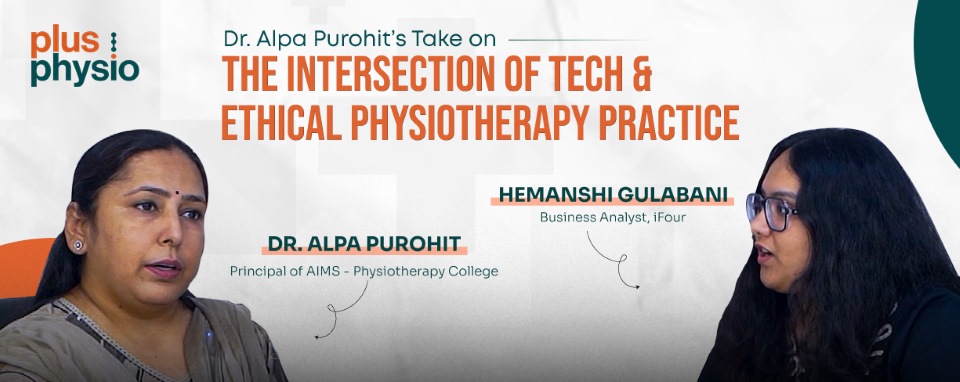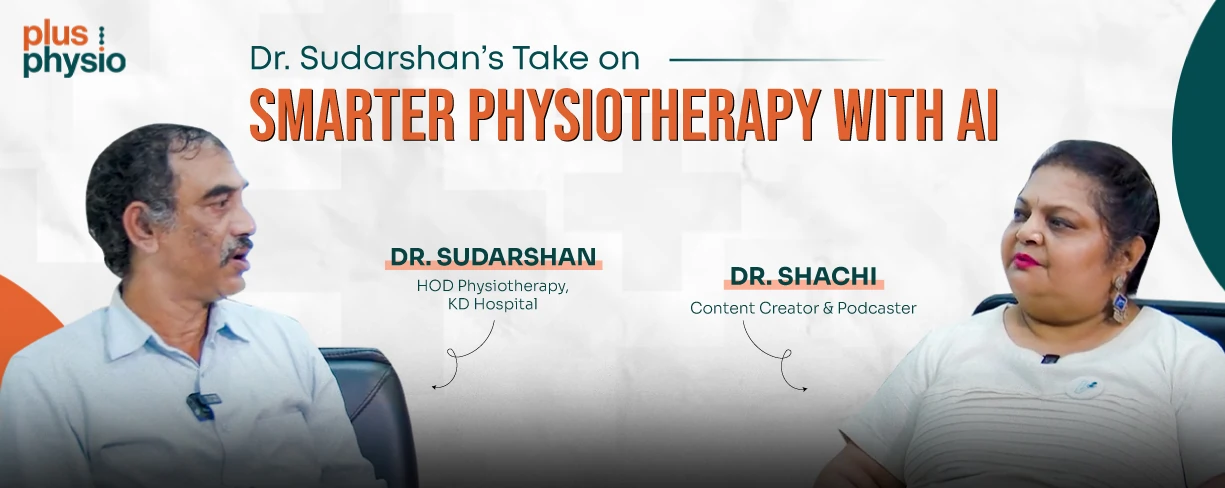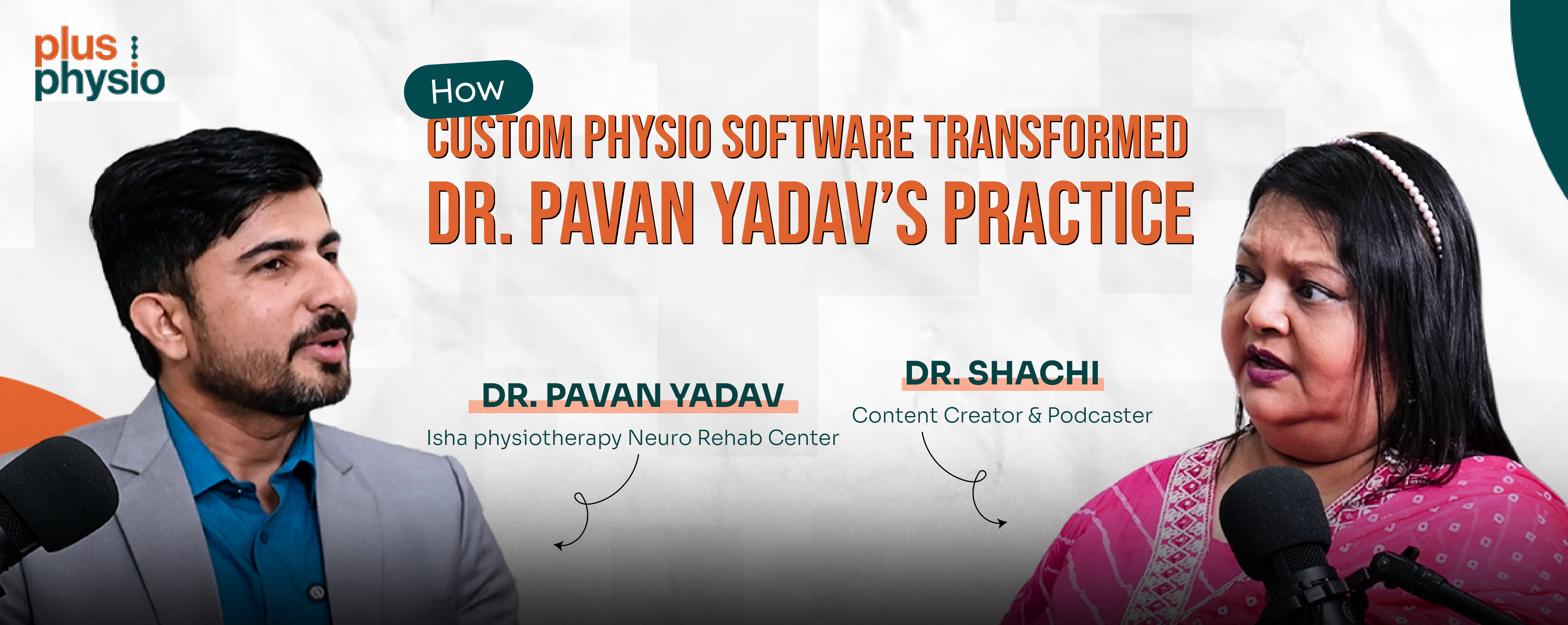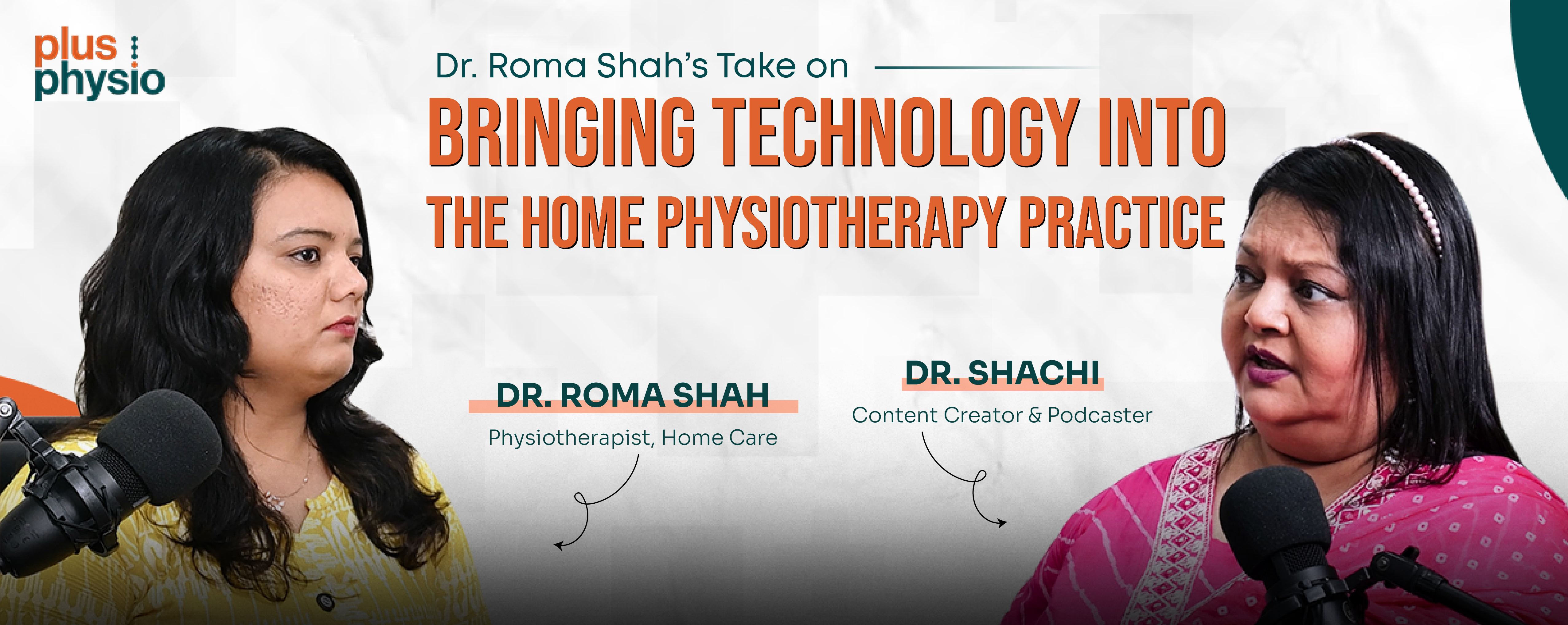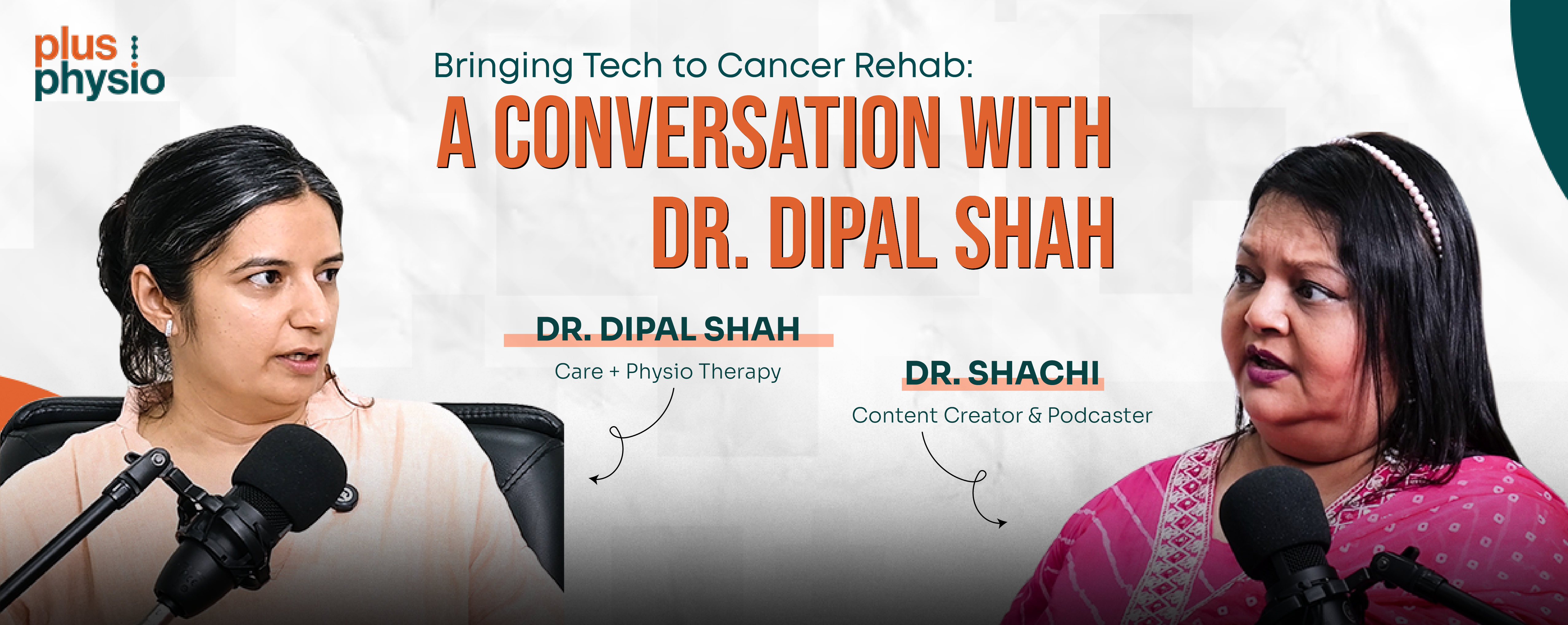From Ahmedabad to the World: Dr. Utsav Parikh’s Take on Physiotherapy and the Role of Technology
When you think of physiotherapy, you might picture a clinic, some exercise mats, and maybe a few therapy machines.
But for Dr. Utsav Parikh — founder of Just Therapy in Ahmedabad — it’s a whole lot more. Not only is he treating patients locally, he’s also part of the growing wave of medical tourism, taking his expertise across borders and welcoming international patients into his care. Recently, Dr. Parikh sat down with Dr. Shachi to talk about his journey, the rise of AI in physiotherapy, and why the right software could be a game-changer.
When asked what inspired him to become a physiotherapist, Dr. Parikh didn’t hesitate. “My sister is also a physiotherapist. I saw her growth, and I knew if I became a doctor, I’d only become a physiotherapist. The treatments have no side effects — that’s the best part.” After completing his Bachelor’s in 2018, he began practicing independently in 2019, focusing on home care instead of traditional in-clinic services.
While many physiotherapists work from a fixed location, Dr. Parikh runs operations from a base in Gota, Ahmedabad, while partnering with hospitals and other centers for home visits. “We provide every advanced treatment at the patient’s doorstep — even some AI-assisted machines.”
Here’s where things get interesting.
Dr. Parikh’s team currently juggles multiple tools: WhatsApp for booking, Excel for scheduling, Apple Notes for session records, and Google Pay for payments.
This works — but it’s far from seamless.
A single integrated physiotherapy software could centralize all these tasks.
So why hasn’t he made the switch?
Two words: Data Security.
“When you use many software, you never know where your data is going. Even high-security systems can face breaches. Data is like a fixed deposit for a business owner.”
His caution isn’t unfounded — he recently faced an online impersonation scam, reminding him how vulnerable digital information can be.
One of the most fascinating parts of the conversation was Dr. Parikh’s view on engagement. He treats patients from South Africa, Brazil, the US, UK, Canada, New Zealand, and more, with most referrals coming through word-of-mouth. His team follows up personally, which he believes software alone can’t replace.
“Software doesn’t create that human presence. People can tell the difference between a real voice and a recorded one.”
That said, he agrees that software could help remind his team to make those calls — easing his workload while keeping the personal connection intact.
Dr. Shachi pointed out something many in healthcare overlook: not all physiotherapists work the same way.
Dr. Parikh’s practice model — mobile, collaborative, international — demands custom software that can grow with him, not a generic clinic management tool.
Dr. Parikh’s closing words were simple but powerful:
“Decide your field first, then invest accordingly. Don’t fear the cost — it’s an investment that pays off in five or six years. Software will save time, help manage more patients, and let you focus on growth.”
He’s living proof that starting small and thinking big — with the right tools — can take your practice global.
Below is the verbatim transcript of the conversation between Dr. Utsav Parikh and Dr. Shachi for readers who want to explore the discussion in its original format.
DS
Dr. Shachi
We are now going to have a conversation with a physiotherapist who believes in medical tourism. Not only is he treating physiotherapy patients from all over the world, but he actually makes trips to other countries and other cities for medical tourism, especially to propagate physiotherapy. So, knowing his take on the AI environment and software technology where physiotherapy is concerned is a good idea, and it will help us gain further insights into whether a software specifically created for physiotherapy is actually going to make a difference. So please welcome Dr. Utsav Parikh.
DS
Dr. Shachi
Hi, how are you?
UP
Dr. Utsav Parikh
I'm fine, thank you.
DS
Dr. Shachi
So Utsav, we basically wanted to understand what inspired you to become a physiotherapist?
UP
Dr. Utsav Parikh
Uh, so when I'm talking about my journey, my sister is also a physiotherapist. So I saw the growth with doctors and all this stuff. So whenever I cleared my schooling and all that stuff, I was clear about one thing: if I become a doctor, I will become only a physiotherapist because there's a future trend, so I have to become one. And the best part, you know, in physiotherapy, all the treatments have no side effects. So that's the best part about becoming a physiotherapist for my life.
DS
Dr. Shachi
Yeah, okay, so when did you graduate?
UP
Dr. Utsav Parikh
So I finished my Bachelor's in 2018. I started my practice in 2019, and from 2019, I'm working individually with children.
DS
Dr. Shachi
Oh, so you haven't worked with another practice? You haven't had your own clinic as such? Do you have a base clinic?
UP
Dr. Utsav Parikh
I have a base, which is an institute in Gota, and the second one is 3.600.
DS
Dr. Shachi
And you haven't worked for any other hospital?
UP
Dr. Utsav Parikh
No, no, we are just working with collaborations right now to take home care assignments.
DS
Dr. Shachi
Alright, so basically home assignments.
UP
Dr. Utsav Parikh
Yeah, yeah. When I talk about us, how we work, so I'm a founder of Just Therapy, and we are working in Ahmedabad exclusively with home care. So we collaborate with centers, doctors, and hospitals to take on the whole home care segments to provide every consultation, every advanced treatment at the doorstep at a convenient time. So we are working like that.
DS
Dr. Shachi
And do you use machines?
UP
Dr. Utsav Parikh
Yeah, everything you get at your doorstep with advanced treatments, even the huge AI machines which are actually, you know, helping completely, you know, someone who has been traumatized in an accident.
DS
Dr. Shachi
I have seen these machines at several physiotherapy centers which are linked to a computer; they are so huge that it's not possible to take them to a house. They are calibrated with the help of AI, and the person is suspended in it, and exercises are done with the machine with precise readings which you people are feeding into it. So those kinds of machines are...
UP
Dr. Utsav Parikh
That's called the robotic, robotic therapy. So right now, robots are coming in smaller ways where you can travel with the robots, and you can put them at home and provide a patient for a treatment.
DS
Dr. Shachi
So you have that kind of facility, facilities in-house over that?
UP
Dr. Utsav Parikh
But right now, we are working with very minimized things in robotics. So we are expanding very soon with the big stuff because, you know, in the center, when you're working with robotics, it's very easy. But in the home, it's very difficult to travel, managing the time of patients and all that stuff. So we are gradually growing on that.
DS
Dr. Shachi
What about booking your appointments or doing follow-ups? Do you have a system? Are you using paper or are you using a software?
UP
Dr. Utsav Parikh
Uh, for those things, we are using two ways. When we plan for consultations, first we book the appointments. So we are totally working with the WhatsApp concept. So the patient gets the appointments, our details, all the stuff they are sending before we reach for a consultation at that place. Once they confirm about the timing, that is put in our Excel sheets that the time will be fixed for the patients, and at that time, we have to go for consultations. Once they confirm, we go for consultations, we go for assessments, we go for treatments and all this stuff we have to describe in the consultation. We see the patients, and then the patient will take the call when they finalize about that stuff, like we are starting the treatment from that day, that time, and all that stuff. So again, the same things are done in our Excel sheets, and we have to book the codings, and that's how we plan for treatments and all that stuff. So if we give 30 sessions of time, it's around 30 days, even if we finish in 15 days, it depends on the condition and the recovery of the patients. So all that data we are recording in our Apple Notes, which is connected to our team's Apple phones, and also in Excel sheets.
DS
Dr. Shachi
So you are basically using four-five different software like Notes, Excel sheets, and what about payment?
UP
Dr. Utsav Parikh
So payments we receive online like Google Pay and some major...
DS
Dr. Shachi
That's another software. So you don't have one software doing all your work, but you have several software. So why is the fear which is keeping you from actually investing in a proper software?
UP
Dr. Utsav Parikh
Yeah, so see, we tried to do something about that, but you know, when you are working with the home care segment, it's very difficult to track in every direction. When you have a centralized practice, it's very easy because the patient is coming, we just go for taking their name, age, what problem they have, which doctor to consult, and they're putting it in the database. But in a home care segment, there's a, you know, 60 to 70% chance of cancellation of appointments and all that stuff.
DS
Dr. Shachi
Okay, what if somebody were to give you a software which would be operable on your mobile and maybe with the help of a cloud, was, you know, distributed to your entire team, and you were able to get it centralized on that cloud, and all your team was able to access the software, it fixes your appointments, would you not go in for a software?
UP
Dr. Utsav Parikh
And that, definitely, we will. That software will definitely be chosen, but till now, we didn't get any touch of like that people those are running on that software. Because we are using many software, you know, that is a big, big problem, the data leak. So where your data is going, you never know.
DS
Dr. Shachi
Okay, and that is a very serious problem.
UP
Dr. Utsav Parikh
Serious problem because you don't know about where the company is. There are many clouds which are very safe, and they give you compliances, like even WhatsApp recently has started encrypting messages. I tell you, I recently tell you one more thing: two days ago, someone created my Instagram profile. My account is a professional account, which is running and gets security from Meta and all that stuff. Then, after that, someone created another account and they were asking about money from my followers. Okay, so that glitch, whatever stuff you are using on a high security level, there is a loss, and there are rules and regulations to be broken down by people. So there is a big fear about how you conduct your data safely in your security deposits. Because it's a fixed deposit for every owner.
DS
Dr. Shachi
But there are a large number of people practicing on safe clouds, and if a cloud has been assigned to you and paid by you, the chances of that kind of a glitch occurring are very minimum. So if you do come across it, that is something that you would definitely go in for. Now another thing that I want to know was engagement. See, you are basically, like you said, you are going for home visits. Not only that, you have venturing into the field of medical tourism, where you are inviting people who are visiting India for tourist purposes to actually get your physiotherapy done. Not only that, you do it vice versa; you go to different countries and you conduct your physiotherapy workshops there as well. Because recently, I know you've been to South Africa and you have done a stint over there. So in this kind of a situation, you are getting people not just from one city, you are getting people from multiple cities, you are getting people at multiple times, and you need to do patient engagement. You need to find out if the patient is actually benefited from that treatment, whether the follow-up of one week, two weeks, one month has been carried out, and whether the results have been positive or you need to do something further. So in this kind of a situation, wouldn't a software really help?
UP
Dr. Utsav Parikh
It definitely helps a lot.
DS
Dr. Shachi
Things, because are you currently using any software which is only looking into engagement for this?
UP
Dr. Utsav Parikh
For engagement, we are not using any software. Uh, because I tell you, till date, we are not getting any person where we met for that stuff. Okay, so we are quite lacking about this stuff. But right now, how do we manage it? So first, we manage on Excel sheets and second, Apple Notes. Okay, and 70 to 80% of the referrals are coming from different countries. Till date, I've got many patients from international settings. The majority is coming from:
Okay, till date, we have very good connections over that. Okay, so the majority, 60 to 70% of the clients and the referrals are coming because of referral to referrals. Okay, so there is no direct... we had once the patient is coming here, they take treatments, they see the difference in how we are working differently in the field of physiotherapy from other physiotherapists. They are aware about that stuff, they recovered, and they are satisfied with our treatments. So they tell their contacts, we tell their networks, then they bring some relatives and all that stuff. So that chain we are working from a long period of time. And for that, we have to maintain the same thing what we are using right now over here for the local population of India and the communities. Okay, so when the patient is entering, so we have one of the best parts, we are more focusing on the follow-ups. So I have two or three team members who are taking follow-ups for the patients. They are only assigned for that work.
DS
Dr. Shachi
But then you can save on that money if you have a software.
UP
Dr. Utsav Parikh
Yeah, but you know, software doesn't create that presence of a human mind where the person will create that presence in the human mind, like someone is checking. Personal touch is something a software lacks. Because if you are doing... can we do that very easily? A WhatsApp message, any email dropped over here? I tell you one more thing: if I see some message, I see a notification after two or three days, I'm seeing the message. Same thing is happening with everyone because everyone is busy with their works. And why would you get a call with somebody who is actually worried about, about...
DS
Dr. Shachi
But then you can save on that money if you have a software.
UP
Dr. Utsav Parikh
Yeah, but you know, software doesn't create that presence of a human mind where the person will create that presence in the human mind, like someone is checking. Personal touch is something a software lacks. Because if you are doing... can we do that very easily? A WhatsApp message, any email dropped over here? I tell you one more thing: if I see some message, I see a notification after two or three days, I'm seeing the message. Same thing is happening with everyone because everyone is busy with their works. And why would you get a call with somebody who is actually worried about, about...
DS
Dr. Shachi
Okay, I believe that AI is coming up with, you know, ideas where the call is made for this very reason, that they make a call in an artificial device.
UP
Dr. Utsav Parikh
I tell you what: most of that artificial voice and the human voice, there is some difference. Okay, so that people feel like someone is sitting over there, which gives a personal touch for us. And that AI, they understand by that it's a recorded stuff and other stuff they are listening and putting down that, no conversation will happen. So personal touch is very important for engagement. Post-treatment engagement is best with human beings, and you feel...
DS
Dr. Shachi
But if there was a software reminding the human being to actually make that, that would really...
UP
Dr. Utsav Parikh
That can be helpful. Okay, so right now, I have to take the calls for my team: you have to call them, you have to call them, you have to call them. So I have some burden on my shoulder.
DS
Dr. Shachi
Basically, I think your practice is different from what other physiotherapists are doing. So you require a software which is being customized specifically for you and which is regularly upgraded as and when you encounter problems to upgrade that same software specifically with you. I believe software is doing that now, and PlusPhysio, who has actually invited you on this panel to talk, has also found glitches that many physiotherapists don't practice in the same way, so the software needs to be modified according to them. So I think your problems, which are quite unique, they are not very similar to other physiotherapists, are definitely going to help in the long run. Advice to budding physiotherapists: So what is your advice to budding physiotherapists and the use of software? Not to get scared of the training, not to get scared of the expense, and whether it is okay for a small setup also and whether it's okay for a big practice as well.
UP
Dr. Utsav Parikh
See, whenever you start the journey, decide first your field where you have to work and then plan accordingly. Don't think about that there's a big investment, there's the biggest amount what you have to spend. This is an investment which will give results after five to six years. Your process will be easy when you have a bigger team, when you have a bigger number of patients, you can easily manage that data and treatments and all that stuff. Then you can make a ready plan for your treatment where your team member will be easily handled by recording your treatment plans. You don't have to teach the other person and all that stuff, where you save your time. And that time you can invest in your marketing and managing the team and all that stuff where you have to grow, even if you are expanding your centers, expanding your practice in other countries, like we are doing the same things. So there's a very important part to putting an advanced thing. Whenever you start the journey, you will see everyone starts with small and reaches to big. So whenever you start, take the good stuff in your physiotherapy where you have to work very well. You can get peacefulness by working with these things. So this is my advice to you. You are saving more time in the longer run by using a software which makes life easier, right?
DS
Dr. Shachi
So thank you very much, Utsav, for such valuable insight into the use of software in physiotherapy practice. And we hope to see you again soon and wish you best of luck for your medical tourism. May you have more and more countries in your city and make India go wide.
UP
Dr. Utsav Parikh
Thank you, Ma'am. Thank you, thank you so much.
Physiotherapy is evolving — with AI, robotics, and software playing bigger roles every year. But as Dr. Parikh reminds us, technology should enhance, not replace, the personal touch that keeps patients coming back.
